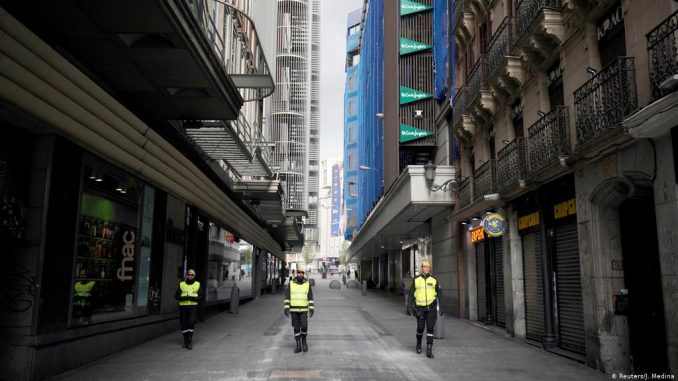
The last Sunday of 2020 was ushered in with both promise and apprehension on the global pandemic front.
The European Union began immunizing residents with the Pfizer-BioNTech vaccine. “We are starting to turn the page on a difficult year,” said the president of the European Commission, Ursula von der Leyen, in a video posted on Twitter. The E.U. she added has “secured enough doses for our whole population of 450 million people.”
At the same time, some of the year’s most severe lockdowns and travel restrictions are being implemented around the world, prompted by concerns that new variants of SARS-CoV-2, the virus that causes COVID-19, could lead to more rapid spread.
According to the African CDC report on Thursday 24th December 2020, another new variant of the novel coronavirus seems to have emerged in Nigeria, cautioning more investigation was needed.
The news comes after Britain and South Africa both reported new variants of the SARS-CoV-2 virus that appear to be more contagious, leading to new travel restrictions and turmoil in markets.

The U.K. variant, which is now the dominant strain in Britain, “may be more transmissible than previously circulating variants, with an estimated potential to increase the transmissibility of the virus by up to 70%,” according to a statement from the U.S. Centers for Disease Control and Prevention. There are similar concerns about a new strain from South Africa that may be circulating in other countries as well.
On the domestic front, travellers arriving in the U.S. from the U.K. are now required to show proof of a negative COVID-19 test under new rules issued by CDC on Christmas day.
More than 40 other nations have gone even farther, blocking travelers from Britain entirely. Despite such measures, the new strain has already been detected in mainland Europe, Israel, Canada and Japan, among other places.
In response Japan is banning nearly all foreigners (the declaration lists nationals from 152 countries as personae non gratae at least until February) and is imposing new restrictions on Japanese citizens returning from any country that’s reported cases of the U.K. variant. The new Japanese rules also apply to places where the South African strain is circulating.
A surge in cases and concerns over the more highly transmissible forms of the virus prompted Israel to go into its third lockdown on Sunday. For at least the next two weeks, Israelis are prohibited from visiting someone else’s home or traveling more than 1,000 meters from their own home – a little more than half a mile. All non-essential businesses are shut. Restaurants can only offer take out.
Gatherings such as weddings and funerals in Israel will be limited to 10 people indoors and 20 outside. This is generous compared to Hong Kong, which has put in place a “prohibition of group gatherings of more than two persons.” On Sundays in Hong Kong foreign domestic workers traditionally have the day off. Groups of women from the Philippines and Indonesia gather in small groups in parks and on sidewalks all across the city. They often share soft drinks and snacks. Municipal officials are now calling for them to stay home at their employer’s apartments.
Hong Kong is also increasing quarantine requirements for incoming travelers. While some other places are shortening COVID quarantines from 14 days down to 10 or 7, Hong Kong is now requiring a mandatory 21 days. The quarantine is at the travelers own expense in a government-sanctioned hotel.
Thailand, which had kept its daily tally of reported COVID-19 cases in the single digits for much of the pandemic, is grappling with its worst surge to date. Since mid-December, the country has seen a sharp rise in cases linked originally to a seafood market, including 121 new infections on Sunday. The spike in cases in Thailand has not been tied to the U.K. variant. But it illustrates that even countries that appear to have the disease under control can’t let their guard down.
South Korea, which successfully contained two earlier waves of COVID-19, is facing record numbers of new cases and a spike in fatalities.
The United States, which already has the largest number of cases globally and regular reports of more than 200,000 new infections a day, is also bracing for grim numbers ahead. Over the weekend top health officials warned that travel and family gatherings during this holiday season are likely to lead to a further spike in cases.
“As we get into the next few weeks, it might actually get worse,” Anthony Fauci, the nation’s top infectious disease expert told CNN on Sunday.
Even though the U.K. variant hasn’t yet been detected in the U.S., many top immunologists believe it may already be circulating here.
“I think it’s prudent and a good idea to do some form of testing, and not let somebody on the plane from the U.K. unless they have a documented negative COVID-19 test,” Fauci said. Given the high levels of transmission already occurring in the U.S., a more transmissible form of the virus could mean more even more dire numbers just as massive vaccine campaigns are starting.
CONSPIRACY THEORIES AROUND COVID-19 AND ITS VACCINES (9News Nigeria : According to a report by Chicago Tribunes)
Amid all these efforts by governments around the world, there still lies a challenge for public health officials trying to convince a wary portion of the public that the COVID-19 vaccines are safe and effective. Phoney assertions have circulated for months on social media, joining a current of anti-vaccine sentiment that has grown stronger over the last 20 years.
A poll released last week showed that only 47% of Americans plan to get the vaccine. Those who didn’t want it mostly said they were concerned about side effects and the development and approval process, though the poll didn’t ask about many widely circulating myths.
Fact-Check: Is the covid-19 vaccine safe?
Zizi Papacharissi, a communication and political science professor at the University of Illinois at Chicago, said social media has made it easy to amplify vaccine fabrications. Though companies like Facebook and YouTube have pledged to suppress such misinformation, she said that happens only after it has already spread.
“Any action they take is retroactive,” she said. “ … Putting something over it that says, ‘This is possibly misinformation,’ or taking the post down, it’s not really going to help. In fact, it might do the opposite. It might attract even more attention.”
As the rollout begins, here are common myths about COVID-19 vaccines and what experts have to say about them:
Myth #1: The vaccine contains a microchip
The fear of being tracked via surreptitiously implanted microchips has existed for years, but some researchers say it became linked to COVID-19 vaccines by InfoWars, a conspiracy theory website from Alex Jones.
The idea is that the chips will allow the government and corporations to surveil people who get the vaccine. Microsoft founder Bill Gates and cell towers using 5G technology are also allegedly involved.
Thomas Hope, professor of cell and developmental biology at Northwestern University Feinberg School of Medicine and a COVID-19 vaccine researcher, said that technology does not exist. And even if it did, he said, the microchips would have to find their way into multiple vaccines created by different companies.
“If someone (advancing this theory) has a phone in their hand, I would say you’re being tracked right now,” he said. “Why would someone else have to do it?”
Myth #2: The vaccine will alter your DNA
A video that misrepresents remarks Gates made about COVID-19 vaccines has convinced some they can change DNA, the molecule that contains a person’s genetic code.
The video appears to confuse DNA with messenger RNA, which is used by the new vaccines to direct cells to create components of the coronavirus, though not the entire thing. Immune cells detect those components and create antibodies that ward off the actual coronavirus should a person be exposed.
Hope said DNA and messenger RNA are entirely different molecules.
“There’s no DNA with (the) vaccines, so there’s no possibility it could alter your DNA,” he said.
Myth #3: The vaccine will give you COVID-19
This belief appears to stem from the fact that some vaccines, such as those for measles, mumps and chickenpox, do indeed use live but weakened viruses to stimulate an immune response. Flu shots do the same thing with dead influenza viruses.
The messenger RNA vaccines don’t use the coronavirus, live or dead, and thus are incapable of infecting someone with COVID-19, said University of Chicago Medicine infectious diseases expert Dr. Emily Landon.
“These don’t have anything to do with the virus,” she said. “… There’s no virus involved in the process of doing this at all, which is why it can be made so much faster (than traditional vaccines).”
Some who received the Pfizer vaccine have reported fleeting side effects reminiscent of COVID-19, including fever, chills and fatigue. But Dr. Robert Citronberg executive medical director of infectious disease and prevention for Advocate Aurora Health, said they are just a sign that the immune system is kicking into gear.
“These minor side effects are exactly what we want,” he said.
Myth #4: Our immune systems are better than vaccines
A popular social media claim, circulated by Sen. Rand Paul, R-Ky., and others, says the vaccines are inferior to people’s immune systems in protecting against COVID-19.
This belief conflates two numbers: the survival rate of those who contract the virus, which is about 99%, and the roughly 95% efficacy rate of the vaccines under consideration in the U.S.
Asked about the claim, Citronberg responded: “Those comments are from people who are not really good at math or biostatistics.”
He said the survival rate still means hundreds of thousands will die from the disease. The vaccines’ high efficacy rate, much higher than that of flu shots, could swiftly bring about herd immunity that would prevent people from encountering the virus at all, Citronberg said.
And even though COVID-19 spares the vast majority of people it infects, he said, tens of thousands of people will suffer aftereffects for a long time.
“Even if you don’t die from it, you may have to live with it, which can be disabling,” Citronberg said. “I think people don’t understand that either.”
While this sort of pushback against vaccine myths is happening in many quarters, Papacharissi said it might not be enough to counteract the conspiracy theories. Subscribing to falsehoods has become a form of identity, she said, a way people can reflect the mistrust they feel toward the government and media.
“Until we repair that relationship of trust, we’re going to have problems sharing the truth,” she said.
